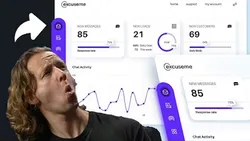
Google Tag Manager Tutorial 2021 for Beginners (with Google Analytics 4 examples) 
Google Tag Manager is a powerful tool that helps users manage and track website tags. This tutorial provides an overview of the platform, including how to create a container, install the GTM container, and use tags, triggers, and variables. It also provides examples of how to use Google Analytics 4 with GTM. ▼
ADVERTISEMENT
Course Feature
![]() Cost:
Cost:
Free
![]() Provider:
Provider:
Youtube
![]() Certificate:
Certificate:
Paid Certification
![]() Language:
Language:
English
![]() Start Date:
Start Date:
On-Demand
Course Overview
❗The content presented here is sourced directly from Youtube platform. For comprehensive course details, including enrollment information, simply click on the 'Go to class' link on our website.
Updated in [February 21st, 2023]
- Intro
- What is Google Tag Manager?
- Create your first container
- Account overview
- How to Install Google Tag Manager
- Temporarily inject GTM container
- Tags, Triggers, and Variables
- Quick introduction to Google Analytics 4
- Tags. How to install Google Analytics 4
- Testing tags + Preview mode
- Publish tags
- Implementing Custom Scripts
- Introduction to Google Analytics 4 event tracking
- Triggers + event tracking in GA4
- Example: link click tracking
- Final words
(Please note that we obtained the following content based on information that users may want to know, such as skills, applicable scenarios, future development, etc., combined with AI tools, and have been manually reviewed)
This course provides an overview of Google Tag Manager (GTM) and Google Analytics 4 (GA4). It is designed for beginners and covers topics such as creating a container, installing GTM, tags, triggers, and variables, and how to install and test GA4 tags. It also covers how to implement custom scripts and GA4 event tracking, as well as an example of link click tracking. By the end of the course, participants will have a better understanding of how to use GTM and GA4 to track and analyze website data.
[Applications]
After completing this course, users should be able to apply the knowledge they have gained to their own websites. They should be able to create and manage their own Google Tag Manager containers, install Google Analytics 4, and implement custom scripts and event tracking. Additionally, users should be able to use the Preview mode to test their tags and triggers before publishing them.
[Career Paths]
1. Digital Marketing Manager: Digital marketing managers are responsible for developing, implementing, and managing marketing campaigns that promote a company's products and services. They are also responsible for creating and managing digital marketing strategies, analyzing data, and optimizing campaigns. As digital marketing continues to grow, the demand for digital marketing managers is expected to increase.
2. SEO Specialist: SEO specialists are responsible for optimizing websites and content to increase organic search engine traffic. They use a variety of techniques, such as keyword research, link building, and content optimization, to improve a website's visibility in search engine results. As search engine algorithms become more sophisticated, the demand for SEO specialists is expected to grow.
3. Social Media Manager: Social media managers are responsible for managing a company's social media presence. They create content, monitor conversations, and engage with followers. As social media continues to grow, the demand for social media managers is expected to increase.
4. Web Developer: Web developers are responsible for creating and maintaining websites. They use a variety of programming languages and technologies to create websites that are visually appealing and easy to use. As the demand for websites continues to grow, the demand for web developers is expected to increase.
[Education Paths]
1. Bachelor of Science in Computer Science: This degree path focuses on the fundamentals of computer science, such as programming, software engineering, and computer architecture. It also covers topics such as artificial intelligence, machine learning, and data science. This degree is becoming increasingly popular as technology continues to evolve and become more complex.
2. Bachelor of Science in Information Technology: This degree path focuses on the application of technology to solve business problems. It covers topics such as database management, network security, and web development. This degree is becoming increasingly popular as businesses rely more heavily on technology to stay competitive.
3. Master of Science in Data Science: This degree path focuses on the analysis of large datasets to uncover insights and trends. It covers topics such as data mining, machine learning, and predictive analytics. This degree is becoming increasingly popular as businesses look to leverage data to gain a competitive edge.
4. Master of Science in Artificial Intelligence: This degree path focuses on the development of intelligent systems that can learn and adapt to their environment. It covers topics such as natural language processing, computer vision, and robotics. This degree is becoming increasingly popular as businesses look to leverage AI to automate processes and gain a competitive edge.
Course Provider

Provider Youtube's Stats at AZClass
Discussion and Reviews
0.0 (Based on 0 reviews)
Explore Similar Online Courses

Understanding Customer Relationship Management Basics

How to Design a SICK Dashboard UI in Figma

Skillshare Course Marketing

The Six Ways To Make Money Online

Find and Close Clients for Social Media Marketing FAST

Create A Professional Online Presence Course - FutureLearn

Complete Twitch Streaming Tutorial Series: PS4 Xbox One PC

Social Media Optimization & Automation with HootSuite

Free Interview Practical Guide for Social Media Marketing

Chatfuel: The Complete Guide to Messenger Bots for Business

Using Social Media for Business - Online Course


Start your review of Google Tag Manager Tutorial 2021 for Beginners (with Google Analytics 4 examples)